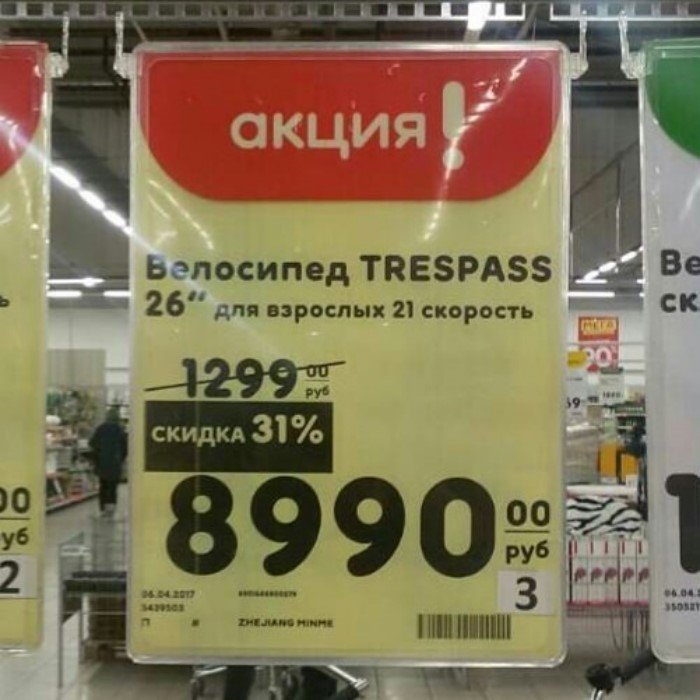We can talk about personalization as much as we like, Dadaism in design, nativeness and involving interactive in 2019. But what's the point, if in the real world, behind the doors of conferences and digital agencies, thousands of companies are still stupidly striving to stand out - the slogan is louder, the picture is brighter and more provocations are higher than the chances that they will notice. Often this happens and brave advertisers come under the scrutiny of the Federal Antimonopoly Service.
In my regular column “Caution, FAS!” On the Rookee service blog and recently here, every month, I look at the latest examples of unfair advertising. In this issue, we will discuss whether it is legal to promise conscripts to receive a military ticket, why the seller should be able to count, and how much is the bare truth.
The jungle's name
News for all bloggers, streamers and other free artists aged 18 to 27 years: on October 1, the autumn draft began in the army. And if attempts to get a higher education were unsuccessful, and flatfoot of the 3rd degree was not found on its own, an advertisement can only be saved from a year of life away from the PS4 and the battles for Azeroth. The main thing is that it corresponds to the letter of the law. And this is not so simple.
In May of this year, the Kemerovo OFAS Russia declared the following advertisements illegal:
“No Call”
Legal military card <...> st. Bardina, 26, office 413, 4th floor priziva.net
License for medical activities No. LO-55-01-001026 dated 04/11/2013 »
Everything is great in this ad. The first is misleading. The phrase “PrizhetNet”, despite the promising message, turned out to be just a verbal trademark. Actual services of an advertiser are consultations on legal and medical issues, and not what everyone thought about. And even if everyone knows that, it’s forbidden to advertise this. Perhaps that is why the advertiser’s website has the disclaimer “We do not sell military tickets” and the word “legally” is so suspiciously often repeated:
 Screenshot from priziva.net
Screenshot from priziva.netSecondly, there are ambiguities with the license for medical services. That she was issued to one legal entity, then to another. The site administrator is generally a third-party individual entrepreneur. In general, everything is confusing. By the way, the administrator was eventually recognized as an advertiser and brought to justice. This turned out to be quite convenient: a
fine for violation of the requirements of Part 7 of Art. 5 of the Law "On Advertising" for entrepreneurs from 4 thousand to 24 thousand rubles, but for legal entities - from 100 thousand to 500 thousand rubles. The difference is palpable. We are waiting for the final decision of the Kemerovo OFAS.
And the Military Commissariat of the city of Ukhta of the Komi Republic was attracted by another advertisement with the image of a military card:
VVK MILITARY DOCTOR COLLEGE
MILITARY TICKET AND DELAY ON LEGAL BASES
voenniy-bilet.ru
8-912-100-40-04
CALL NOW!
As in the first case, OFAS in the Komi Republic
decided : the text of the advertisement in question encourages draft evasion. Violates the law and the visual. On the cover of a military card was depicted the state emblem - a double-headed eagle without a heraldic shield. By virtue of Art. 5 of the Law "On Advertising",
advertising should not prompt the commission of illegal actions and it does not allow the use of official state symbols (flags, emblems, anthems). For these two reasons, an administrative offense has been brought against the advertiser.

Mathematics - Queen of Sciences
Everyone likes discounts and promotions on goods. But how often do we read the essence of promotional offers or double-check the promised profit in money? But an advertisement that contains information that does not correspond to reality about the cost of the goods and the amount of discounts is recognized as unreliable (clause 4 part 3 of article 5 of the Law on Advertising).
The Finnish fair in Kemerovo promised a unique 70 percent discount on all products for customers who visited it on June 21 from 10:00 to 19:00. As an example of an attraction of unprecedented generosity, an advertising booklet promised:
Branded jackets and comfortable shoes SOFI women's jacket (Finland) for 13700 4900 rubles,
BAYER jacket for men (Germany) for 17500 6900 rubles,
PENSIDE women's slip-ons (Finland) for 3600 1200 rubles
And everything would be fine, but that's just the price of 13,700 rubles. with a discount of 70% was supposed to be 4 110 rubles, and not 4 900 rubles. Similarly, the cost of a jacket instead of the declared 6900 rubles. should be 5,250 rubles. An incorrect discount price was indicated for absolutely all positions in the ad. The last cherry on the cake from the misconceptions was that the actual seller of clothes had nothing to do with Finland. The advertiser was a regular Russian LLC. Therefore, he had no reason to call the fair “Finnish”. As a result,
Kemerovo OFAS Russia is considering bringing the seller to administrative responsibility.

Bad with math and the famous Zenden shoe brand. The action “A discount of 25% on the second pair of shoes, 70% on the third” seems to describe a simple situation: you buy two things — they give 25% off the second, you buy three things — they give 25% off the second and 70% % The Expert Council of the UFAS of the Volgograd Region also
decided , checking the correctness of this advertisement.
In fact, the terms of the action were completely different. Firstly, the discount was not given from the second or third position on the check, but from the cost of the second or third product
with the lowest price. And secondly, when buying three things on the stock, a
25% discount on the second product was not applied. That is, of the three products, the price of only one with the lowest cost decreased by 70%. You could find out about these conditions on the website
www.zenden.ru or by carefully studying the information stand in the store itself. However, the latter came up with a funny situation. When checking it turned out, the size of the text with the conditions for the alternative use of discounts is only 1 mm. That is, it was almost impossible to read it without using special tools. But the large slogan inside the store itself, which promises attractive discounts, has become the basis for recognizing advertising as inappropriate and violating the requirements of Section 5 of the Advertising Law.

Three letters
The BarberMAFIA network of men's hairdressers in Tatarstan decided to use the impudent slogan “Do not be shaggy”, not suspecting the consequences of the chosen style of communication with the audience:
 Screenshot vk.com/barbermafia.kazan
Screenshot vk.com/barbermafia.kazanBeing “FAG” is not prestigious, not a luxury and not at all mainstream. Ozhegov’s dictionary interprets the word “sucker” as “indecent, shameless”. So either go to BarberMAFIA, or put an end to the girls and rock and roll. At least, the
advertising message of the Tatar OFAS was so
appreciated. According to paragraph. 4 h. 4 Article. 5 of the Law "On Advertising", advertising should not form a negative attitude towards persons who do not use the advertised goods, or condemn such persons. In the indicated example, according to experts, the use of upper case letters in the word “LOKhmatym” forms a negative attitude towards those who do not attend the advertised salon. Simply calls them suckers. The case is fresh, it was instituted only in August. So we are waiting for what penalty you can get for the three letters Caps Lock in advertising.

By the way, under the same article, in early September, Yandex.Verticali LLC received a
fine of 100 thousand rubles for advertising the Auto.ru service. The basis for the initiation of proceedings was the appeal of a citizen with a claim to a number of commercials. In one of them, the buyer and the seller discuss the car being sold. And they raise the question of why the announcement of the sale was not posted on the site
www.auto.ru.According to the FAS Russia , this advertisement forms a negative attitude towards people who do not use the Auto.ru service. According to the meaning of the video, if the announcement is not on the disputed resource, then the transaction is doubtful. And this is a clear violation of the Law on Advertising.
Without insurance
We often promise things that we cannot or do not want to do. Is it about a meeting we’ll never go to? About confessions that we will never make. Or a gift to a friend who is unlikely to ever present. But if the consequence of our hasty words is only a smile and the irony of those close to us, then in an advertisement every unrestrained promise can cost hundreds of thousands of rubles.
"M. Video" promised its customers insurance against curvature and bad luck. “Equipment insurance is your protection in case something happens with the new device. Poured tea on a brand new laptop? Have your smartphone been stolen from your purse? Insurance will reimburse all losses! ”
- attracted advertising
on the company website. And those who have ever poured a laptop with sweet tea or lost a telephone in a vehicle know the pain of this situation.
 Screenshot from www.mvideo.ru/strahovanie
Screenshot from www.mvideo.ru/strahovanie .
Imagine the surprise of a buyer who, after buying a mobile phone and taking out insurance, found out: a simple theft from his pocket and hand luggage does not fall under the insured event! This is clearly stated in the contract of the partner M.Video - Alfa Insurance:

That is, no body - no business. You also need to be able to confirm the insured event: to report the theft, provide notification of the acceptance of the application by law enforcement agencies, a copy of the inspection of the scene, a decision to institute criminal proceedings ... Perhaps your Samsung or Xiaomi was not worth such efforts even in its best years. Naturally, there was no indication of these pitfalls of receiving insurance in the advertisement.
Extreme found quite quickly.
The regulator established that advertising was carried out at the initiative of M.Video without approval from Alfa Insurance. Therefore, the responsibility was assigned solely to the seller of equipment.
In my opinion, punishment could be avoided by adding a disclaimer in the source text: “Insurance will indemnify all losses! * (* If there is documented evidence of the occurrence of the insured event. A full list of risks and exceptions to insurance is available on the website:
www.alfastrah.ru/docs/ mvideo.pdf ). " No matter how clumsy it may look, such a phrase could reduce complaints to the FAS from consumers who naively believe in the simplicity and ease of receiving payments on the insurance policy. But it is not exactly.

Naked truth
An interesting way to attract attention was chosen by one restaurant in Kazan. He did not rely on food or a cozy atmosphere. His trump card was the staff:
 Photo vk.com/club139289074
Photo vk.com/club139289074This advertising banner sparkles with all shades of hidden and not very meanings. Some were offended by an inappropriate public space for such advertising. Like, children see, children repeat. Others reproached for the lack of a full price list. The point in disputes was
put by the OFAS in the Republic of Tatarstan , calling the advertisement “sexist” and making an unexpected conclusion:

According to antitrust officials, advertising on the exterior facade of the building, when consumers pay attention only to the large print from the roadway, makes it impossible to evaluate the phrase “bare truth”. Everyone sees only the phrase "naked waitress." At the same time, advertising is not just about the restaurant staff, but about a female employee! That is, the slogan intentionally insults and humiliates the representatives of this service sector, as it is “based on the exploitation of the sexuality of the female body”.

In general, I understand the position of the FAS, since I also read the announcement in its most provocative context. However, I’m not sure that this announcement is the most humiliating. Rather, it is insulting and insulting when a naked girl causes laughter, and not some other desires. Therefore, I propose to look at this advertisement from the point of view of a restaurant visitor. Write in the comments what the waitress really needs to do to make you smile :)
Even more examples of unfair advertising in my previous issues of “Caution: FAS!” On the Rookee service blog.